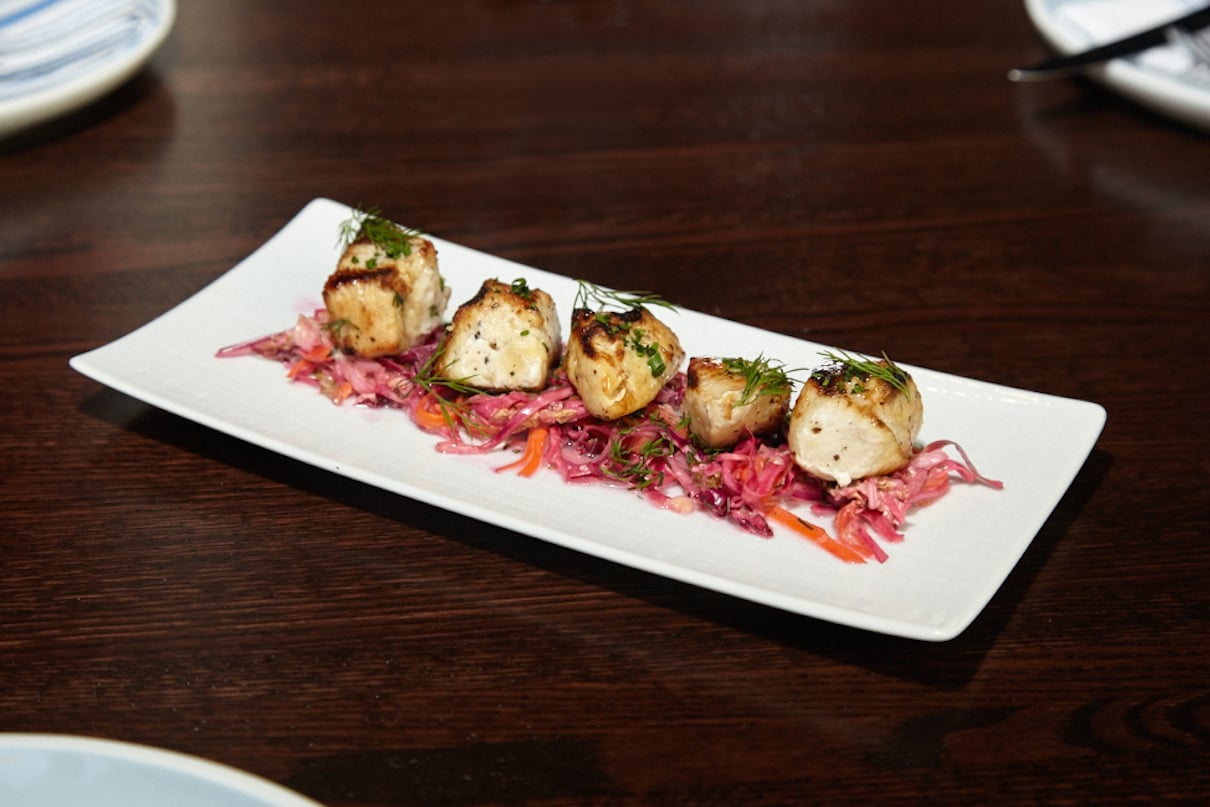If I’d learned any lesson from Thanksgivings past, it’s that you’re a fool for getting too fancy with the food. One year I brought a mostarda I’d made to the meal. A mostarda’s an Italian dish, a sweet fruit compote laced with mustard. I knew I’d failed the moment I began explaining it to the table. Who the hell wants to eat a Thanksgiving dish that needs to be explained?
There I go again, I thought: Thinking like a critic, when I should have been thinking like an eater. Was it any wonder why no one but my parents ever invited me to their house for dinner anymore?
So last week I told myself: Keep it simple. Please the people.
That meant cooking people-pleasing dishes.
Now, big roasts and lots of starches — that’s not my game when I cook. Nor am I particularly fond of cooking from recipes. I always feel like an actor who hasn’t yet moved off-book. I’m following, I’m not making. I feel passive, not active, inhibited, not creative.
But this year — cooking for seven, running the show for the first time — I felt I needed to arm myself. I mentioned my gameplan to a colleague, who kindly gave me a recipe for a cranberry-cherry compote she adores. Another contributed a recipe for a corn pudding made with bacon drippings. I happen to love sweet potatoes, but I knew that others who would be at the table don’t, and I was determined to make something they would eat, so I pored through cookbooks looking for the right combination of ingredients. I found one that sounded simple: reduce four cups of apple cider to one cup of syrup, stir into a bowl of warm, softened sweet potatoes, then add grated fresh ginger and butter. Mashed potatoes were mashed potatoes: What could be easier?
We needed a vegetable.
“Are you sure?” my wife asked.
“Why,” I said, “you don’t think anybody will eat it?”
“I mean, I will.”
Here, I didn’t need a book. I would reprise a dish I had done years earlier, only this time I would leave out the coarse fresh black pepper that triggered an asthma attack in my sister-in-law and nearly sent her to the hospital. (And nothing with almonds, either — she had severe nut allergies, too.)
My guests, I reasoned, might not care for green beans, but I knew they cared for bacon. So, rather than make a green bean dish with bacon as the adornment, I would make a bacon dish with green beans in the secondary role.
The turkey was another matter. I knew it would be a heritage turkey, and had signed up for one weeks earlier thanks to an assist from the Post’s former food critic, Phyllis Richman. On Tuesday, my wife had picked up the bird at a pre-arranged delivery spot from our trusted source. She’d even paid cash. It had all the trappings of a drug deal.
That same day, I had written about the heritage turkeys on the chog. In touting the virtues of these native, free-range breeds as a critic, I had forgotten about my vow as a cook. Friends and relatives began asking questions about it. Was it, um — wild? Was it going to be all dark meat? Did it taste like turkey or like game?
Uh oh.
It’s turkey, I told them, only better. Watch. You’ll see.
I’d quelled their fears, only to raise their expectations. Brilliant.
I went online looking for heritage turkey recipes. Each one seemed to contradict the other. Cook it fast, and hot. No, cook it low, and slow. Brine it, you need moisture with a lean bird like this. Don’t brine it, you’ll kill the natural flavor of the meat.
The fast and hot method seemed to make the most sense to me, and Phyllis gave it her endorsement, too. Now, I needed a recipe. After days of searching, I found one from Zak Palacio, the young, talented New York City chef. The name, and the reputation, should have ruled him out, but the recipe looked good. It called for a sage butter to go under the skin, and a maple butter to go over the skin. It might not be subtle, I figured, but subtlety wasn’t my worry. Satisfying a crowd was. And there wasn’t a fussy eater in the world who didn’t love butter, or what butter did to nearly every food it touched.
There was only one problem. In the midst of my worry about pleasing each and every guest at the feast, I’d somehow forgotten that my mother is lactose intolerant.
It was too late, though. I’d already bought the many sticks of butter — European, unsalted. In my mind, I had committed to the Palacio recipe, and could not conceive of preparing a wild turkey any other way. I reminded myself to tell her to take her pill before coming over.
As for my father and his mania to limit his sodium intake … I would salt liberally, as the occasion demanded, and deal with the repercussions when they came.
Wednesday night, I got down to work.
The sweet potatoes turned out perfectly, although, looking over the recipe after I’d finished with it, I saw a note I hadn’t registered before: “Can be served up to four hours ahead.” Oh, no, I thought. The ginger. Of course. It’s going to take over the dish by morning. It’ll be inedible by meal-time.
Luckily, I had a dinner to get to, and couldn’t worry about it more.
Actually, there was another worry to replace it. My other sister-in-law, the one who had no allergies, was set to bring a pumpkin pie. Now she sent an email saying she had decided to go ahead and make a sweet potato dish as well.
“It’s got bourbon and maple syrup in it,” she wrote proudly. The tone felt mocking, somehow. And I knew that, if you asked nine out of ten people, sweet potatoes with bourbon and maple syrup > ginger. And not by a little but by a lot.
But I knew that keeping it simple meant not getting carried away with the little things.
There was just enough time to start on the cranberry-cherry compote before heading out. The recipe called for the cherries, shallots and sugar to cook down for forty-five minutes before adding the cranberries.
I was changing my clothes when I noticed a sharp, dark, winy smell coming from the kitchen.
If it had cooked too long, I told myself, I’d know it when I came back later. It had. I returned from dinner and started the compote all over again.
The next morning, I pulled the compote from the fridge and took a taste. Oniony, Winy. Visions of my failed mustarda filled my head. There was no way I was going to serve it. At least the sweet potatoes hadn’t devolved into a bitter, gingery puree. Not yet. My wife headed out to the store — our fourth shipping trip in three days — for more cranberries.
I improvised a quick and simple recipe for my third attempt at a compote — two packages of cranberries, zest of two oranges, juice of one orange, a cup of water, three-quarters of a cup of sugar, and a few cubes of candied ginger I’d bought last Thanksgiving — and started on the bacon-with-beans.
“What are you going to put the turkey in?” my wife wanted to know.
I pointed to the two aluminum roasting pans I’d bought.
“Huh?” she said.
I explained that I’d planned to cut the pans at the ends and join them together to make one, large pan to hold the sprawling bird.
“And what’s going to happen to the fat that’s going to drip and fall outside the pans?”
“Well, we can always just bunch up some aluminum foil around them.”
“So what you’re saying is, you haven’t really thought about it.”
“I thought about it,” I said. “I just didn’t think about it the way that you thought about it.”
“Uh huh.”
“I’m serious.”
“Look, we could start a fire in here if we’re not careful.”
“I need to concentrate on my beans.”
It was a quick fight. It ended when we discovered that, in fact, the turkey could be squeezed into a single roasting pan, which meant that I hadn’t thought it through and was wrong, and that she’d overreacted and was wrong, too.
I was happy with that outcome. Two wrongs didn’t make a right, exactly. But we were even.
I slathered the bird down with butter. It was more butter than I’d use for two, three dishes. And the bacon! The smell of rendered pig fat filled the house. If nothing else, the smells would be convincing.
Everything made it to the table, and the meal was only an hour later than promised. I popped the cork on a bottle of Riesling, and another on a bottle of Chianti.
I anxiously awaited verdicts. The critic, awaiting his critics.
The turkey looked beautiful: plump and brown and glistening. “It eats like a steak,” said a friend of mine.
Is that a good thing? I wondered, thinking back to people’s fears. It was. Good. And he loved the corn pudding — until I told him about the great gobs of bacon grease that went into it.
“There’s no bacon in here.”
“Why do you think you’ve had four helpings?” I said.
Having learned the deep, dark truth, he barely touched the fourth, but others kept on eating.
Now that it was over, I felt I could go ahead and share the story of the two failed compotes. But I told them before they’d really dug into version three. Dug in: Nobody really digs into a cranberry compote, in my experience. Small, polite spoonfuls. I was wrong to have expected anything else. And wrong, I told myself, to have fretted over three versions.
The bacon beans were a hit. So were the white potatoes, which I’d put through a ricer to give them a soft, fluffy texture.
My sister-in-law had handed over her sweet potatoes as she came through the kitchen, saying, “Here you go; if you want to put it out, that’s fine, if not, that’s fine, too.” I put it out.
It was crowned with lightly browned mini-marshmallows and tasted like booze and candy. But it went over.
And, as I saw now, looking out across the table and the picked-over dishes — mine went over, too.
I had made room for both dishes on the table, sweet and savory; now, stoked by the wine and the warmth of family and friends around me, I found myself making room for them in my imagination: The thing you can control and the thing you can’t. Keeping it simple and making it complicated. Fighting and letting go.
It was a good night. My mother didn’t get sick. My father didn’t gripe about things being too salty. The one sister-in-law didn’t wind up in the hospital, and the other sister-in-law didn’t resent me for going ahead with my own version of sweet potatoes — at least not publicly. My wife and I didn’t have another argument all night. The kitchen didn’t go up in flames.
And l learned, almost too late, to stop worrying and love Thanksgiving. The food? The food is just the excuse to get together.

















